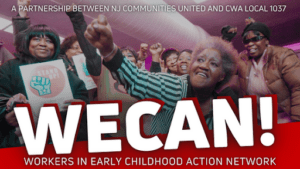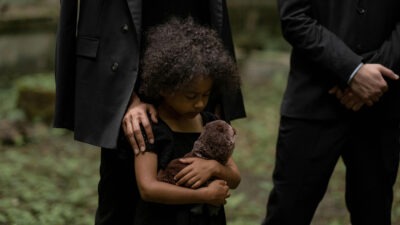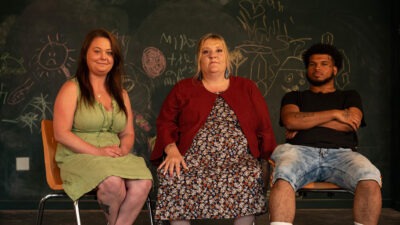This post is also available in: Español (Spanish) Kreyòl (Haitian Creole)
The LIFT Fund is a first-of-its-kind collaborative between philanthropy and labor that, with the support of the W.K. Kellogg Foundation, supports new forms of worker organizing to achieve economic equity, thriving families and stronger communities.
When child care provider Joanne Richards became a leader in her local union, it was a natural way for her to live out her commitment to serving families and her community of Passaic County, New Jersey.
Child care providers like Richards are the linchpins of their communities. During children’s early years, the most critical period for children’s overall development, they help provide the care children need to ensure the best start in life. These providers also support parents, who can work knowing their children are receiving the care they need to thrive.
Despite the vital role child care providers play in communities around the country, these providers earn poverty-level wages, making an average of $14.22 per hour in 2022 and earning less than 98% of all other occupations in the U.S. annually. The lack of a living wage for child care providers also further exacerbates gender and racial pay gaps, as 90% of child care providers are women and 40% are people of color. In an industry that is woefully underfunded, Black and Latina women keep child care services — and communities — afloat.
To address these significant workforce challenges, a unique collaboration between organized labor and a local nonprofit organization emerged. New Jersey Communities United (NJCU) and Communications Workers of America Local 1037 partnered to form Workers in Early Childhood Action Network (WECAN!). With grant support from The LIFT Fund, WECAN! was created to build a child care movement in New Jersey to respond to the growing U.S. child care crisis. WECAN! operates a community-based model that relies on people like Richards to serve as community shop stewards who fan out into their communities to reach providers one-on-one, building relationships and keeping a lookout for issues that impact the work-life and well-being of providers. Through this model, WECAN! ensures children receive quality care, communities remain vibrant, and that child care providers work in safe environments and earn a living wage.
“As shop stewards, we cover specific geographic zones where we are able to get to know workers and understand their needs. We develop the knowledge of the local issues at stake so that union leaders can mobilize resources to respond to the changing needs of providers and the community,” said Richards.

The COVID-19 pandemic proved how effective WECAN!’s model is for addressing provider and community needs. As essential workers had greater child care needs than ever, child care providers faced the added risk of exposure to COVID-19 and had little knowledge of how to keep themselves safe. So, Richards and two other WECAN! shop stewards enlisted in a state-funded “train-the-trainer” health and safety program with Rutgers University. In a matter of weeks, WECAN! trained more than 350 child care workers, helping to keep New Jersey children, families and providers safe during an uncertain and frightening time.
But WECAN!’s work didn’t stop there. Richards notes that the health and safety workshops doubled as case studies for how workers can challenge inequitable power structures and create community-based solutions. WECAN’s speed and effectiveness in providing necessary resources to workers through these workshops demonstrated to workers the value of organized labor, causing many to formally join their union.
“The pandemic period has proven our model’s might in swiftly addressing workers’ concerns and achieving tangible improvements in their working conditions,” said Trina Scordo, Executive Director for New Jersey Communities United. “By meeting workers where they are and building relationships at the community level, we provide the necessary training, support and power-building that enables workers to win better conditions for themselves, and in turn, strengthen the communities where they work.”
The child care workers’ power movement in New Jersey continues to gain momentum as it increases resources for child care, expands access for working families and improves the working conditions for child care workers across the state. Richards sees the tide changing too; the health and safety workshops doubled as education on the “union difference,” says Richards, when center-based providers saw the power that organized family providers leverage to get what they need.
As more organizations and communities around the country undoubtedly grapple with how to recruit more child care providers, increase the attractiveness and viability of these jobs, and ensure proper wages and worker protections, WECAN! presents a successful model of how to tangibly improve workers’ conditions by building their power and capacity to get what they need.








Comments